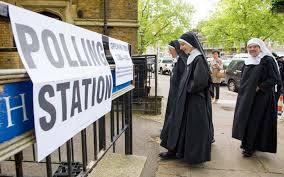
On the Feast of the Epiphany, before breakfast, I opened the curtains in the kitchen and saw three mourning doves resting on the wires in our backyard. Usually, there are only two resting there, and usually it’s in a warmer season, not in the nine-degree cold of a Wisconsin winter. Wisconsin doves apparently migrate south for the winter, but other doves, and in particular male doves, are wont to migrate from Canada and remain in Wisconsin during the frosty season. In an imaginative leap I felt nature was in tune with the acknowledgement of the three Magi who had come from the East, and I was glad we had added the three Magi figures to the nativity set that marked the Christmas season in our front yard.
I had not been in the habit of reflecting much on the Epiphany over the years. Christmas and the meaning of the Incarnation had been my focus. However, this year was different, perhaps because we made a conscious effort to add the Magi figures to the nativity set to mark the arrival of the wise men at the appropriate time. Remember, the Magi were not there on Christmas day itself, when Jesus was born. They came later.
So the importance of the Feast of the Epiphany, fittingly enough, came as an epiphany to me.
The teaching surrounding the Epiphany is plain enough. At first the birth of Jesus was revealed to the Jews. But with the coming of the wise men from the East, who represented all people, even to the far ends of the earth, Jesus, our Savior, was revealed not only to the Jews but to all people. No one is left out of the Christian plan of salvation.
There are so many angles from which one can approach the significance of the Magi coming to acknowledge the Messiah, the anointed One.
I would like to emphasize this: Not only are all people included in the plan of salvation that Jesus brought into the world in the sense that no one is rejected, no one is left out, but beyond that, the Christian plan of salvation is the plan for all people. The Magi came to Jesus from the far ends of the earth because Jesus had the truth for everyone.
Now to some that seems a rather presumptuous idea. We live in such a time of relativism, that some Christians will say that Christianity is the truth for us, but not for everyone. Those Christians will say that some cultures prefer other views—such as Hinduism, Buddhism, Taoism, Islam and Judaism– and that we cannot impose our view on them or even assume we are right and they are wrong, or at least that we are more right than they are.
The Catholic Church has taught that Catholicism has the fullness of the truth—which means that although other views may not be completely wrong, they are not completely right either.
I do believe Catholicism has the fullness of the truth. And I’m not saying that in the sense that someone might, for instance, root for one’s own football team as being the best. One could rationally think all football teams should have equal respect but then in one’s heart of hearts, so to speak, still favor one’s own team and very much want it to win.
It’s not some sort of personal bias like that which results in my saying that I think Catholicism is right. I’m convinced from an intellectual and aesthetic and moral perspective.
I think the plan of sacrificial love that is at the heart of Christianity is indeed the truth that will save us. When God who is almighty and powerful and magnificent beyond understanding deigns to allow Himself to become a little baby, vulnerable, at the mercy of those around Him, needing the assistance of others, He has made a sacrifice for us in that Incarnation in order to fully communicate with us. A God who is love wants to communicate with His creatures. As all lovers know, one wants to be with and to communicate with the one who is loved.
When He takes upon Himself the suffering due to sin by dying on the Cross for us—in order to make up for our sins–he is carrying out sacrificial love. Imagine when someone hurts you: in order to forgive that person, one has to absorb the pain of the injury and love the offender despite the offense; it is a sacrifice to do that. Jesus’ dying on the Cross is that sacrifice that allows reconciliation between creature and Creator after sin has taken place. Mother Theresa said, “Love until it hurts.” God loved us so much, he sent His Son to die for us, so that we can be reconciled with Him in forgiveness.
In the Catholic Church’s teaching on the Holy Sacrifice of the Mass, the beautiful idea continues. Jesus’ sacrifice on the Cross is not repeated but rather accessed and shared in when we offer ourselves, too, in sacrifice, in union with His sacrifice on the Cross, when we partake in the Holy Eucharist, which is bread and wine transformed into His body and blood and then consumed. In consuming Him, who gives Himself in sacrifice to us in the most intimate way possible, we allow ourselves in turn to be consumed by others in service, in love, in a spiritual sacrifice.
The world needs sacrificial love and can only be saved through sacrificial love. Imagine, to use a mundane example, how it would be in traffic without sacrifice—without each person giving up his or her own desires, his or her own need to proceed on the road. Traffic would end up in chaos.
Many of our lives are in chaos.
What a healing balm it would be for the world to take up the idea of sacrificial love. Feuds would stop. Families would heal. Wars would cease. Countries would be at peace.
The sacrificial love of Jesus comes as a revelation—is revealed—to all people. Jesus—the Way, the Truth and the Life—is not just the truth for some. As the epiphany to the Magi shows, He is the Truth for all.
Marianne Bovée
